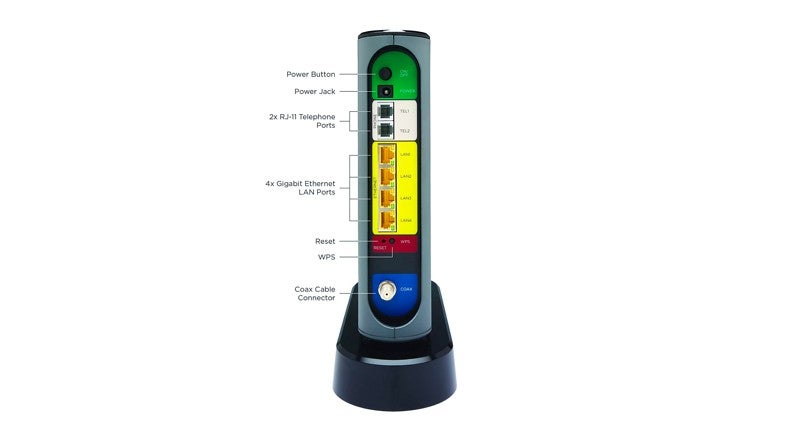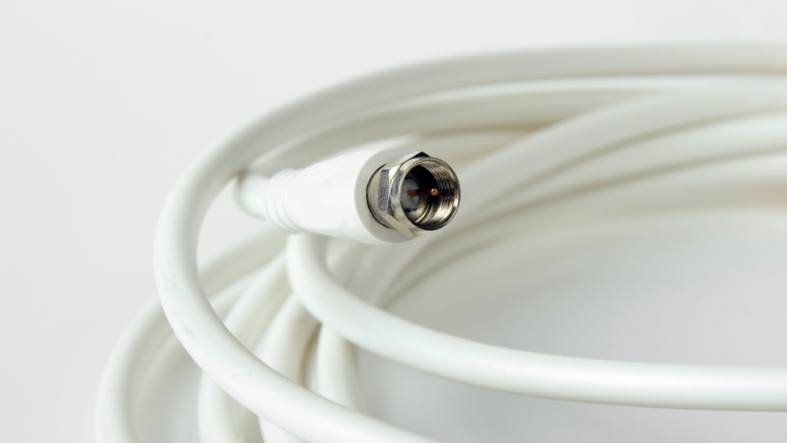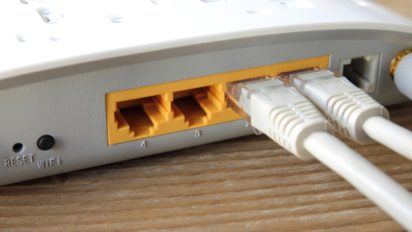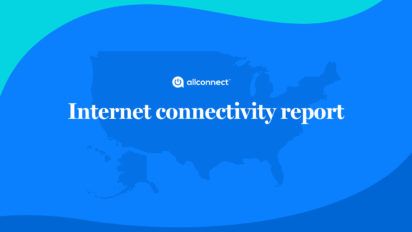You might already know there are different types of internet services. DSL, cable internet, fiber-optic, satellite and fixed wireless internet are some of the most popular kinds. But how do you know what type of connection you have at your home? And why does it matter?
Don’t let the type of internet you have to be a mystery to you any longer. Find out all you need to know about the broadband connection you have at your home. Here’s how to tell what type of internet you have.
Why you need to know what internet connection type you have
You may not have been the person to shop and sign up for the internet service provider (ISP) you currently use. Maybe you moved into a home or apartment that already had internet service included, or perhaps you just weren’t involved in the initial decision. Whatever the case, the type of internet connection you have might be unknown.
But if you need to work from home, teach or learn remotely or do other activities that require a fast and stable internet connection, you need to know the type of internet you have. Why? To make sure you are getting the best connection for what you and your family are using the internet to accomplish.
Can I tell what type of internet connection I have by the service provider?
Not necessarily. Even if you know the company that provides your internet, it isn’t always obvious what type of connection you have. Several ISPs — such as AT&T, CenturyLink and Frontier — offer more than one type of internet connection under their brand name. It isn’t uncommon for an internet provider to offer DSL, fiber and fixed wireless kinds of connections.
Find out what type of internet connection you have
There is more than one method to determine what type of internet connection your home has. Check out these quick and easy ways to find out what type of connection you are working with.
Find out your internet connection type by equipment
Take a few minutes to locate and examine the internet equipment around your house. Locate your modem and router and see what wires are connected to it. Most current modem and router combos, also known as gateways, will have the type of internet connection clearly marked on the device. But if your modem or router is not labeled, simply find the description below that matches your home set up to determine your internet connection type.
Gateway with ports labeled

- Do you have a satellite on your roof that controls your internet? Then you are using satellite internet.
- Look at the type of plug your modem is connected to on the wall. If it is connected with a coaxial cable, then you are most likely dealing with a cable internet connection. However, if the other end of that coaxial cable connects to a satellite outside your home, then you have a satellite connection.
Coaxial cable

- If you find that the modem is connected with what looks like a phone line, you have either DSL or dial-up internet. If using the internet in your home also ties up the phone line (i.e. you can’t place or receive calls on your home phone), then you have dial-up. If connecting to the internet does not interfere with your home phone, or you don’t have a home phone connection, then you are a DSL customer.
- Is there a port on your modem labeled “ONT” that has a line connected? Then you are dealing with a fiber-optic connection.
- Have a modem and router that just plugs directly into an electrical outlet? This is a sign of a fixed wireless internet connection.
Can you determine your internet connection type using your computer?
Say you don’t want to go rummaging through the modem and router setup, or that area is off-limits to you. Can you still figure out what type of internet connection you have without having to play electrician? Unfortunately, no. Without seeing the equipment, it will be difficult to be 100% accurate on your internet connection type.
You can, however, make an educated guess based on speeds. Run a quick speed test on your computer, and measure the results here:
- A speed of 56 kbit/s or less means you have dial-up internet.
- Speeds of up to 100 Mbps are typically DSL or satellite connections.
- A speed result of 200-1,000 or higher Mbps means you have either cable or fiber-optic internet service. 5G service can also deliver speeds up to 1,000 Mbps, depending on your provider.
Check your internet speed to determine the connection type
Need more for the price?
Try these helpful hacks to improve your internet speed. Or if you just want more bang for your buck, check out providers near you with more speed for the price. Either way, we’ll help you find what you need.
View providers near meRather chat? Give us a call: (844) 451-2720
Rather chat? Give us a call: (844) 451-2720Pro Tip: For best results, use an Ethernet cord to connect your router or modem directly to your device before you run the test.
Now that you know what type of internet you have take stock of what you use the internet for, whether that’s gaming, streaming or basic web browsing. From there, you can decide whether you have the connection and speed you need or if it’s time to switch providers.
Types of internet connections
Before you pick your internet service provider, learn about the different internet connection types and which browsing habits they best serve. Based on your internet usage, you’ll find that certain types of internet connections are better suited for the activities you enjoy.
- Cable – Recommended for moderate users who enjoy web browsing, streaming movies and music, gaming and video chats. The largest providers include Spectrum and Xfinity, despite widespread availability.
- DSL – Recommended for moderate users who enjoy streaming, browsing and gaming. The largest providers include AT&T, CenturyLink and Windstream.
- Fiber-optic – Recommended for avid users who enjoy streaming, gaming, video chats and downloading large files at the fastest speeds available. AT&T and Verizon are top fiber providers.
- Fixed wireless – Recommended for moderate users who enjoy streaming, browsing and gaming.
- 5G – 5G internet is a type of fixed wireless internet that uses 5G cellular technology to bring internet to your home. While not as reliable as cable or fiber, some providers can provide up to 1,000 Mbps. T-Mobile and Verizon are two of the top 5G home internet providers.
- Satellite – Recommended for light to moderate internet users who enjoy streaming music and movies. The largest providers include HughesNet and Viasat.
Many internet connection types offer a range of internet speeds, so in some regions, shoppers can get similar speeds from a variety of providers. In other areas, one type of internet connection may be distinctly slower or faster than another type.
What type of internet connection do you need for your home?
Depending on your browsing habits, a certain type of internet connection may work best for the needs of you and your family. Keep in mind that certain types of internet connections may or may not be available where you live and that providers offering the same type of connection may supply drastically different speeds.
Compare cable, DSL, fiber, fixed wireless and satellite internet connections
If you’re trying to find the best internet connection for your home, compare DSL vs. cable, cable vs. fiber internet and more based on which types are most compatible with your internet usage.
| Activities | Suggested speeds | Cable | DSL | Fiber | Fixed wireless | Satellite |
|---|---|---|---|---|---|---|
| Email, web surfing & online shopping on 1-2 devices | 5-10 Mbps | X | ✔ | X | ✔ | ✔ |
| Email, web surfing & online shopping on 3+ devices | 10-25 Mbps | ✔ | ✔ | X | ✔ | ✔ |
| Streaming video in standard definition | 5-10 Mbps | X | ✔ | X | ✔ | ✔ |
| Streaming video in HD | 10-30 Mbps | ✔ | ✔ | ✔ | ✔ | X |
| Online gaming, 1-2 devices | 10-25+ Mbps | ✔ | ✔ | ✔ | ✔ | X |
| Online gaming, 3+ devices | 25+ Mbps | ✔ | ✔ | ✔ | X | X |
| Working from home | 40+ Mbps | ✔ | X | ✔ | X | X |
How we determined the suggested internet connection types
The chart above is based on the minimum required internet connection speeds, service reliability during peak usage, latency and upload speeds. For instance, satellite internet provides speeds adequate for gaming but has high latency, which often prevents a consistent gaming experience.
Additionally, cable internet and fiber connections can handle most online activities. However, satellite or DSL internet may be higher value options if you mainly use the internet to occasionally browse or stream. The best internet for your home varies by how many connected devices are in use in your household, your online activities and the reliability of your provider
Learn more about how finding the right internet connection can upgrade your home Wi-Fi. Check back at the Resource Center or follow our experts on Facebook and Twitter.
Internet connection type FAQs
Fiber, cable, satellite 5G/fixed wireless and DSL are the different types of internet connection types.
If you’re curious about your internet technology, you can look at your equipment to find out what type of tech you have. Also, your internet provider can let you know more about the technology used to deliver your connection.
Fiber internet is widely considered the fastest and most reliable type of internet available, but cable is also a great choice for home internet.
Written by:
Lisa IscrupeWriter, Broadband & Data Content
Lisa uses years of experience in sales and customer service for internet-TV providers to inform her writing on broadband. Her work has been referenced by CNN and other national sources.
…
Read more
Related pages
-
Featured
![What’s the difference between Bluetooth and Wi-Fi?]() What’s the difference between Bluetooth and Wi-Fi? Lisa Iscrupe — 4 min read
What’s the difference between Bluetooth and Wi-Fi? Lisa Iscrupe — 4 min read -
Featured
![Modem vs. router: What’s the difference?]() Modem vs. router: What’s the difference? Camryn Smith — 6 min read
Modem vs. router: What’s the difference? Camryn Smith — 6 min read -
Featured
![100% of KS and RI residents have broadband access. Where does your state rank?]() 100% of KS and RI residents have broadband access. Where does your state rank? Joe Supan — 5 min read
100% of KS and RI residents have broadband access. Where does your state rank? Joe Supan — 5 min read
Latest
-
Thursday, July 25, 2024
Worried about losing your signal? This is how to keep your satellite dish cleanDavid Anders — 6 min read
-
Tuesday, July 23, 2024
The best free TV and movie streaming services 2024Camryn Smith — 5 min read
-
Tuesday, July 23, 2024
Everything you need to know about internet speedsRobin Layton — 8 min read





